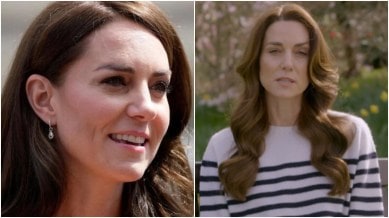📣 For more lifestyle news, click here to join our WhatsApp Channel and also follow us on Instagram
What is ‘preventive chemotherapy’ that Kate Middleton, Princess of Wales, is undergoing post cancer diagnosis?
The specific drugs and dosages used in chemotherapy may vary depending on the type and stage of cancer, the patient's overall health, and any previous treatments received, said Dr Atul Narayankar, consultant medical oncologist, Wockhardt Hospitals.

After weeks of speculation surrounding Kate Middleton’s health and alleged disappearance, in a video message released on The Prince and Princess of Wales’ social media, Kate, the Princess of Wales, detailed her condition and spoke about her cancer diagnosis.
Kate called her diagnosis a “huge shock”. “In January, I underwent major abdominal surgery in London and at the time, it was thought that my condition was non-cancerous,” said Kate, 42, who is married to Prince William, the heir to the British throne.
monthly limit of free stories.
with an Express account.
“The surgery was successful. However, tests after the operation found cancer had been present. My medical team therefore advised that I should undergo a course of preventive chemotherapy and I am now in the early stages of that treatment,” she added.
Taking a cue from her cancer diagnosis, let’s understand what chemotherapy is all about.
To ensure complete microscopic clearance of the disease, especially in those with a high risk of relapse the patient must receive chemotherapy, noted Dr Rekha Bansal, medical oncologist, Apollo Cancer Centre, Jubilee Hills.
Chemotherapy is a form of treatment aimed at destroying any remaining cancer cells in the body following surgery, to reduce the risk of cancer recurrence. While surgery can remove the affected part in an organ, according to Dr Poonam Patil, consultant, medical oncology, Manipal Hospital, Old Airport Road, Bengaluru, it is known that there may be some more cells in the body (either in the blood or any other organ) which could remain after surgery, and cannot be picked up by the conventional tests is generally done. “To take care of these cells, and kill them before they have a chance to divide and grow, chemotherapy or adjuvant chemotherapy, is given,” said Dr Patil.
Experts suggest that chemotherapy typically involves the use of powerful anti-cancer drugs, either orally or intravenously, administered in a series of treatment cycles over a specified period.
“The specific drugs and dosages used may vary depending on factors such as the type and stage of cancer, the patient’s overall health, and any previous treatments received,” said Dr Atul Narayankar, consultant medical oncologist, Wockhardt Hospitals, Mira Road, who emphasised that there is nothing specifically called “preventive chemotherapy”.
While chemotherapy can be associated with side effects such as nausea, fatigue, hair loss, and weakened immune function, Dr Narayankar said that Kate Middleton would have been closely monitored by her medical team throughout the treatment process to manage any side effects and ensure her comfort and well-being. “Additionally, supportive care measures, such as medications to alleviate nausea or strategies to boost immune function, may have been incorporated into her treatment plan to help minimise any adverse effects of chemotherapy,” said Dr Narayankar.
By targeting residual cancer cells and reducing the likelihood of disease progression, Dr Narayankar said that “such adjuvant chemotherapy can significantly improve the chances of long-term survival and enhance the overall quality of life for cancer patients”.
📣 For more lifestyle news, click here to join our WhatsApp Channel and also follow us on Instagram